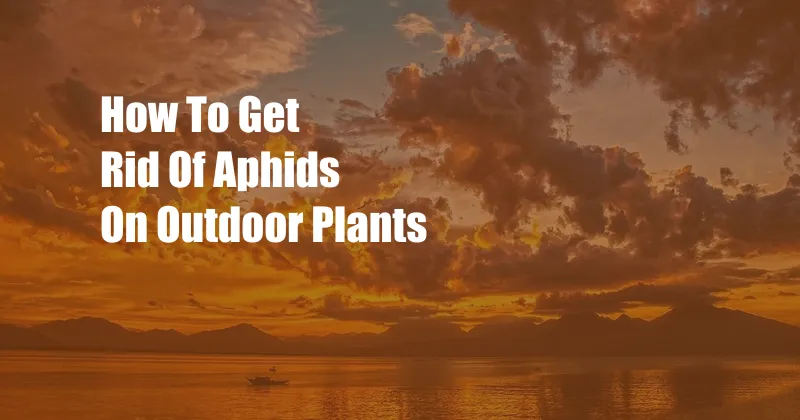
How to Get Rid of Aphids on Outdoor Plants: A Comprehensive Guide
Aphids are tiny insects that can wreak havoc on your outdoor plants. These pests suck the sap from leaves and stems, causing damage that can weaken or even kill your plants. If you’re noticing aphids on your outdoor plants, it’s important to take action quickly to prevent further damage.
In this article, we’ll provide you with a comprehensive guide on how to get rid of aphids on outdoor plants. We’ll cover everything from identifying aphids to using natural and chemical control methods. By following the tips in this guide, you can keep your plants healthy and aphid-free.
Identifying Aphids
Aphids are small, soft-bodied insects that come in a variety of colors, including green, black, brown, and red. They typically measure between 1 and 4 millimeters in length and have two long antennae and a pair of cornicles on their abdomen.
Aphids can be found on all parts of the plant, but they are most commonly found on the undersides of leaves and on new growth. They feed by inserting their mouthparts into the plant tissue and sucking out the sap.
Damage Caused by Aphids
Aphids can cause a variety of damage to outdoor plants. They can stunt plant growth, cause leaves to turn yellow and drop off, and reduce flower and fruit production. In some cases, aphids can even transmit diseases to plants.
Aphids also produce a sticky substance called honeydew. Honeydew can attract ants and other pests, and it can also promote the growth of mold and mildew.
Natural Aphid Control Methods
There are a number of natural methods you can use to control aphids on outdoor plants. These methods are generally safe for plants and the environment, and they can be just as effective as chemical control methods.
Some common natural aphid control methods include:
- Introducing beneficial insects. Beneficial insects, such as ladybugs and lacewings, prey on aphids. You can attract these beneficial insects to your garden by planting flowers that they find attractive.
- Using insecticidal soap. Insecticidal soap is a natural pesticide that can kill aphids on contact. Insecticidal soap is available at most garden centers.
- Using neem oil. Neem oil is a natural pesticide that is effective against a variety of pests, including aphids. Neem oil is available at most garden centers.
- Creating a homemade aphid spray. You can make your own aphid spray by mixing 1 teaspoon of dish soap and 1 quart of water in a spray bottle. Be sure to shake the spray bottle well before using.
Chemical Aphid Control Methods
If natural control methods are not effective, you may need to use chemical control methods to get rid of aphids on outdoor plants. Chemical control methods can be effective, but they can also be harmful to plants and the environment.
Only use chemical control methods as a last resort. Always read and follow the instructions on the product label carefully.
Some common chemical aphid control methods include:
- Using insecticidal soap.
- Using horticultural oil. Horticultural oil is a natural oil that can kill aphids on contact. Horticultural oil is available at most garden centers.
- Using pyrethrum. Pyrethrum is a natural insecticide that is effective against aphids. Pyrethrum is available at most garden centers.
Tips for Preventing Aphids
The best way to control aphids is to prevent them from getting on your plants in the first place. Here are a few tips for preventing aphids:
- Keep your plants healthy. Healthy plants are less likely to attract aphids. Make sure your plants are getting enough water, fertilizer, and sunlight.
- Inspect your plants regularly. Regularly inspect your plants for signs of aphids. If you find aphids, take immediate action to control them.
- Keep your garden clean. Remove any weeds or debris from your garden. Weeds and debris can provide a hiding place for aphids.
- Use companion planting. Companion planting is the practice of planting different plants together that benefit each other. Some plants, such as marigolds and nasturtiums, can help to repel aphids.
FAQ about Aphids
Here are some frequently asked questions about aphids:
Q: What are aphids?
A: Aphids are small, soft-bodied insects that feed on the sap of plants.
Q: What damage can aphids cause?
A: Aphids can cause a variety of damage to outdoor plants, including stunting plant growth, causing leaves to turn yellow and drop off, and reducing flower and fruit production.
Q: How can I control aphids naturally?
A: There are a number of natural methods you can use to control aphids on outdoor plants, such as introducing beneficial insects, using insecticidal soap, and using neem oil.
Q: How can I control aphids chemically?
A: If natural control methods are not effective, you may need to use chemical control methods to get rid of aphids on outdoor plants. Some common chemical aphid control methods include insecticidal soap, horticultural oil, and pyrethrum.
Q: How can I prevent aphids?
A: The best way to control aphids is to prevent them from getting on your plants in the first place. Keep your plants healthy, inspect your plants regularly, keep your garden clean, and use companion planting.
Conclusion
Aphids can be a nuisance, but they don’t have to ruin your outdoor plants. By following the tips in this guide, you can effectively control aphids and keep your plants healthy and beautiful.
Are you interested in learning more about aphids? If so, please let us know in the comments below. We would be happy to provide you with additional information.